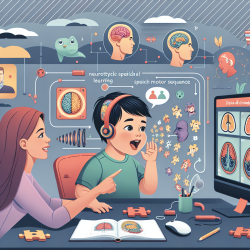Introduction
As a Special Education Director, staying informed about the latest research and its implications is crucial to providing effective support for students with diverse needs. The recent study titled "Missense variant contribution to USP9X-female syndrome" offers valuable insights into the genetic underpinnings of neurodevelopmental disorders, particularly in females. This blog aims to highlight the key findings of this research and explore how practitioners can leverage this knowledge to enhance their skills and contribute to the field of special education.
Understanding USP9X-Female Syndrome
USP9X is a gene located on the X-chromosome, known for its role in brain development and its involvement in neurodevelopmental disorders. The study by Jolly et al. (2020) provides evidence of the contribution of missense and small in-frame deletion variants in USP9X-female syndrome. These genetic variations lead to a clinically recognizable syndrome characterized by developmental delays, intellectual disabilities, and congenital malformations.
Key Findings
The research identified 11 novel variants, 10 of which were previously unreported, and confirmed their pathogenicity through a combination of variant prediction algorithms and protein structure modeling. The study also highlighted the variability in phenotypic presentations among affected females, emphasizing the need for personalized approaches in therapy and support.
Implications for Practitioners
Practitioners in the field of special education can benefit from the findings of this research in several ways:
- Enhanced Understanding: Gaining insights into the genetic basis of neurodevelopmental disorders can help practitioners better understand the challenges faced by students with USP9X-female syndrome and tailor interventions accordingly.
- Personalized Interventions: Recognizing the variability in phenotypic presentations allows for more personalized and effective therapeutic approaches, ensuring that each student's unique needs are addressed.
- Collaboration with Geneticists: Collaborating with geneticists and other healthcare professionals can provide a more comprehensive support system for students, facilitating early diagnosis and intervention.
- Advocacy for Research: Encouraging further research into USP9X and similar genetic disorders can lead to improved diagnostic tools and therapeutic strategies, ultimately benefiting the entire special education community.
Encouraging Further Research
While the study offers significant insights, it also underscores the need for continued research in this area. Practitioners are encouraged to stay informed about ongoing studies and contribute to the body of knowledge by sharing their experiences and observations. Engaging in professional development opportunities, such as conferences and webinars, can also facilitate knowledge exchange and foster collaboration among professionals.
Conclusion
The research on USP9X-female syndrome presents an opportunity for practitioners to enhance their understanding and improve their practice. By embracing the findings of this study and advocating for further research, we can work towards a more inclusive and supportive educational environment for all students.
To read the original research paper, please follow this link: Missense variant contribution to USP9X-female syndrome.










